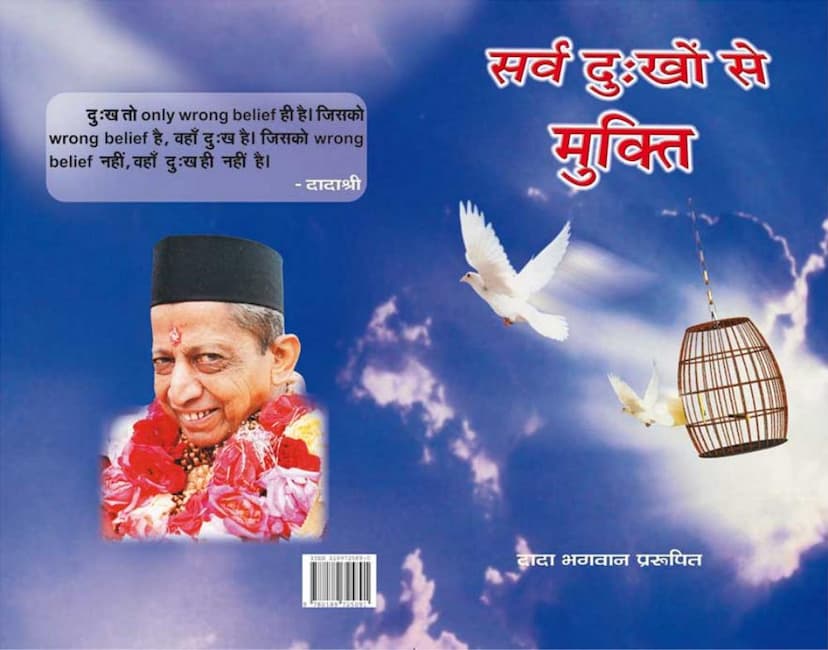Sarva Dukho Se Mukti
Added to library: September 2, 2025

Summary
This document is a summary of the Jain text "Sarva Dukho Se Mukti" (Liberation from all Sorrows) by Dada Bhagwan, published by the Dada Bhagwan Foundation. The core message of the book revolves around the idea that sorrow is caused solely by "wrong beliefs" (mithya darshan or wrong perspective). By dispelling these wrong beliefs and attaining "Self-knowledge" (Atma-jnana) through a Gnani Purush (a Self-realized being), one can achieve liberation from all sorrows.
Here's a breakdown of the key themes and teachings presented in the text:
The Nature of Sorrow and its Cause:
- Sorrow stems from wrong beliefs: The fundamental assertion is that suffering exists only where there are wrong beliefs. Without wrong beliefs, there is no sorrow.
- Ignorance is the root cause: The primary reason for sorrow in the world is ignorance about one's true Self and its nature.
- The Self-realized are untouched by sorrow: Those who have attained Self-knowledge are not affected by worldly sorrows.
The Path to Liberation:
- The role of the Gnani Purush: The text emphasizes that meeting a Gnani Purush is the direct path to liberation from all sorrows. They possess the ability to impart Self-knowledge.
- The Akram Marg (The Effortless Path): Dada Bhagwan's teaching is described as the "Akram Marg," an effortless or shortcut path to Self-realization, contrasting with traditional paths that involve gradual progress (kram).
- Self-knowledge: The ultimate goal is to realize one's true nature as the Soul (Atma). Once the Self is known, everything else is known.
Key Principles and Teachings:
- Natural Law of Cause and Effect: Giving happiness to others brings happiness to oneself, and giving sorrow to others brings sorrow. Understanding this natural principle leads to a state of not giving sorrow to anyone.
- Living in the Present: Dwelling in the past or worrying about the future is a source of suffering. Living in the present moment is the way of the wise.
- Detachment and Non-possession: The principle "Religion should be in business, not business in religion" is highlighted. Dada Bhagwan lived a life of detachment, never taking money from anyone and using his own business income to support others' spiritual journeys.
- Responsibility and Non-violence: The text stresses that we have no right to harm any living being since we cannot create them. This extends to not causing even the slightest pain to any creature through thought, word, or deed.
- The Household as a Company: Family members are likened to shareholders in a company, where each person experiences the profit or loss according to their share.
- Balance of Inner and Outer Happiness: An increase in external happiness leads to a decrease in internal happiness, and vice versa. True happiness lies within.
- Egoism as the Cause of Worry: Egoism (kartapan, "doership") is identified as the root cause of worry.
- Trust in Nature's Justice: Nature's justice is considered infallible, unlike human justice which can be biased. Understanding this justice leads to peace.
- The True Nature of Happiness and Sorrow: Sorrow is not inherent in the world; it arises from wrong beliefs. External pleasures are temporary and often lead to suffering. True, lasting happiness is found within the Soul.
- The Analogy of Blindness: There are two types of "blindness": physical blindness and spiritual blindness (ignorance). Those who are spiritually blind, despite having eyes, cause harm to themselves by their actions and thoughts.
- The Importance of Belief: Right belief (samyak darshan) leads to spiritual progress, while wrong belief (mithya darshan) leads to suffering.
- The Self as the Ultimate Source of Happiness: True happiness is independent of external circumstances and resides within the Soul.
- The "Akram Vigyan" (Science of the Effortless Path): This refers to the unique method of achieving Self-realization quickly and without complex rituals or austerities.
- Forgiveness and Self-Correction: The practice of acknowledging one's faults, repenting, and seeking forgiveness from the Soul (Shuddhatma) is crucial for purification.
- The Law of Karma: Actions have consequences, and these are distributed according to past karma. Understanding this helps in accepting current situations.
- Understanding 'Relative' vs. 'Real': The world operates on relative perspectives and adjustments. True reality is the Soul, which is permanent.
- The Illusion of Ownership: The concept of "mine" and "yours" is seen as a form of wrong belief.
- Living without Clashes: The teaching of "Adjust Everywhere" is a key principle for harmonious living.
- Self-Responsibility: Each individual is solely responsible for their life and choices.
- The Power of the Soul: The Soul is the true Self, and recognizing this leads to eternal peace and happiness.
Practical Guidance:
The book offers practical advice through dialogue and explanations from Dada Bhagwan, covering various aspects of life such as:
- How to deal with disagreements and conflicts.
- The meaning of marriage and relationships.
- The importance of managing emotions like anger.
- How to overcome worries and anxieties.
- The ethical conduct in business and daily life.
- The concept of "Nimit" (an instrument) in cause and effect.
- The nature of divine justice.
Overall, "Sarva Dukho Se Mukti" presents a profound spiritual philosophy that aims to guide individuals towards lasting happiness and liberation by transforming their beliefs and understanding their true Self. The book is presented as a collection of teachings from Dada Bhagwan, aiming to provide practical solutions for overcoming sorrow through spiritual insight.